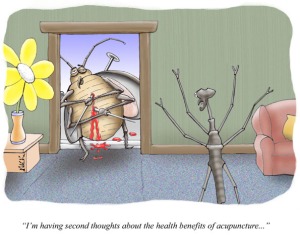My job this summer was set up as such: 75% of my time is spent working on a review paper, 25% of my time is spent shadowing my boss in the clinic and in the operating room.
The “working” part of my job– the part I get paid for– has been both enriching and painful. I have once again confirmed that I will never be able to have a job where I have to sit at a desk and stare at a screen for more than at most 3 hours a day. I need a little more action or I get bored out of my mind. And start a blog.
So for the past two months I have been working on a review paper, scanning and compiling all relevant literature on the efficacy of acupuncture as a treatment (in conjunction with anti-emetics) for chemo-induced nausea and vomiting. I don’t necessarily believe in acupuncture, but I don’t not believe in acupuncture. I am inclined to believe that it’s effectiveness could be due to placebo. But who knows.
Placebo is immensely powerful. A classic study on pain and placebo (whose name I don’t know off the top of my head) has shown that patients who thought they were taking pain meds released the same chemical substances as those who actually were taking pain meds. Remembering back to a paragraph in my neuroscience text book (so this might be a little fuzzy)… I believe the study was done using opioids and placebo to treat acute pain. The patients given the opioid released the chemical substance, which bound to the opioid receptor, causing pain to subside. Patients given the placebo who thought they were receiving the pain medication also released a chemical substance that bound to the opioid receptor, causing pain to subside. To strengthen this argument, researchers also showed that administering an opioid receptor blocker stopped the anti-pain effects of the group taking meds and the group taking placebo.
A placebo effect does not mean that the benefits are simply made up.  A placebo effect can mean that the dummy drug can have the same physiological mechanism as the real drug, which shows us how powerful our brain can be. So, if acupuncture works because of placebo, in my mind, it still works and is clinically useful.
A placebo effect can mean that the dummy drug can have the same physiological mechanism as the real drug, which shows us how powerful our brain can be. So, if acupuncture works because of placebo, in my mind, it still works and is clinically useful.
 A placebo effect can mean that the dummy drug can have the same physiological mechanism as the real drug, which shows us how powerful our brain can be. So, if acupuncture works because of placebo, in my mind, it still works and is clinically useful.
A placebo effect can mean that the dummy drug can have the same physiological mechanism as the real drug, which shows us how powerful our brain can be. So, if acupuncture works because of placebo, in my mind, it still works and is clinically useful. There is plenty of evidence out there, however, to show that acupuncture may be more than placebo. Many of the chemo-induced nausea and vomiting studies consist of three arms. One arm is the treatment group who receives acupuncture, one is the control group that receives no acupunture, and the other is a group that receives “sham” acupuncture– acupuncture done on an insignificant (non-meridian) point. The trend of these studies is to show that the treatment group responds better than the sham group which responds better than the control group. This, in theory, would show that while there is some placebo effect (as shown via the “sham” arm), true acupuncture has more than a placebo effect. Still, I’m not convinced.
Probably because there are few, if any, sound scientific mechanisms that explain how it works. I am aware that this does not mean that a scientific explanation does not exist. It is possible it has yet to be discovered. I just have a hard time believing something unless I can see it explained in a way that makes sense to me. There are, in fact, a few theories that have been proposed to explain why acupuncture works to relieve pain. One of which has to do with the gate control theory for pain. There are no western explanations, however, for why it appears to help nausea and vomiting.
Some would say that there simply is no western explanation for why acupuncture works. Some would say you are stimulating the meridians to open up pathways to balance your yin and your yang and return harmony to your body. Some would say there doesn’t need to be a western explanation. Some would say there is another dimension that science can not and should not explain. I can’t say who is right and who is wrong. All I’m saying is that sounds a little fluffy to me and while I don’t discount acupuncture, I would like to see some more evidence.
